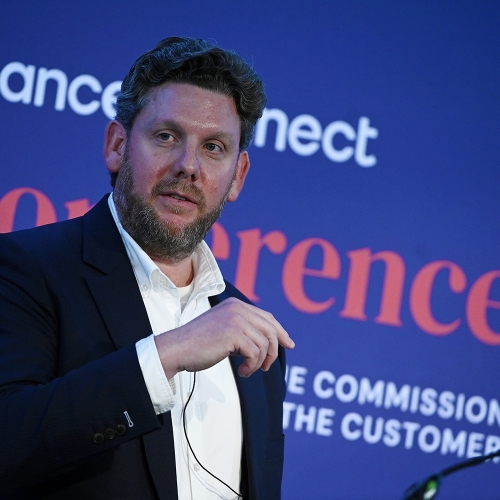Summary
Creating partnerships and ecosystems between lenders and specialist partners to provide strong client-facing asset finance solutions is increasingly becoming the norm within the asset finance industry in order to support the move to net zero.
At the recent Asset Finance Connect Summer Conference, a panel of industry experts from DLL, Lombard, Dell Technologies and Lloyds Banking Group looked at the potential of the asset finance industry to help businesses go through a sustainable energy transition and to help parent companies and partners on their path to a decarbonised economy.
“The whole energy transition is about the orchestration of partnerships.”
Leo van den Dungen, DLL
Partnership between parent company and subsidiary
Stuart Clark, Head of Climate Transition at Lombard sees the relationship between the parent company and subsidiary as fundamentally important to both sides of the business. Lombard is fully aligned with the values and purpose of their parent company NatWest, highlighting their “natural synergies” in working together on their strategy to support their customer base.
As Stuart Clark confirms, “Lombard can enable a faster transition for NatWest customers, for decarbonising transport or stronger and quicker investment in green technology, highlighting the unique role Lombard play in the NatWest Group.”
As part of their green asset finance proposition which was launched last year to support the transition to a low carbon economy, Lombard are playing a key and fundamental role within the NatWest Group with their corporate partnerships.
The partnership with large corporate client McCain, who are increasingly conscious of their ESG commitments, helps to reduce supply chain emissions and also allows Lombard and NatWest to help SMEs and sole trader farmers with access to capital and critical knowledge about the sustainability transition and green assets.
In another example parent company Rabobank joined together with DLL (their asset finance subsidiary), whose partnerships are core to the company. As Leo van den Dungen, Head of
Transformational Growth at DLL confirmed, “without partnerships, DLL would not exist.” Through their partnership, DLL can offer the food and agricultural specialist bank the impact needed for their energy transition through existing partnerships.
Leo van den Dungen noted that DLL and Rabobank wholeheartedly believe that “the whole energy transition is about the orchestration of partnerships.”
Richard O’Donohue, Senior Director, Partner Solutions at Dell Technologies pointed out that, through the partnership with their parent, they are able to leverage a big organisation and access insights into customers’ channel partners, and insights into various parts of the tech business.
Tim Biddle, Head of Asset & Invoice Finance Sales at Lloyds Bank Commercial Banking highlighted the “genuine” partnership between the asset finance product specialist department and the wider Lloyds banking group. Creating an interesting dynamic between parent and subsidiary, Biddle explained how asset finance customers can be introduced to a broad range of products and services from the wider banking group as well as expertise and consultation services, making the sustainable journey for SMEs clearer and more accessible.
Customer benefits
When starting on their sustainability journey, many SMEs are time constrained and don’t have the relevant knowledge and capital. Faced with risk and funding issues, SMEs require guidance and expertise from their trusted banking partner.
The trust relationship that parent companies have with their customer base can be leveraged by the specialist subsidiary companies and their partners, leading to additional business and consultation services for the customer.
For example, Lombard has partnered with specialist green companies to bring services to their clients that can help them to understand their energy usage, reduce costs and take action to save money and cut carbon. For example, through their partnership with Absolar, specialists in renewable energy services such as solar panels, Lombard can offer their clients guidance, funding and energy solutions – a ‘one-stop-shop’ providing a unique, bundled, aggregated green solution for the customer.
Importance of partnerships
Partnerships go beyond a transactional relationship and can plug-in to long-term business strategies within the ecosystem, according to Lloyds’ Biddle. Collaborations are becoming increasingly important in the energy transition in areas where specialist companies can excel and are more knowledgeable with more experience than the partner business.
During sustainability consultations, many banks and finance houses saw the benefits of third-party partnerships leading them to restructure their sustainable propositions. Plugging in partnerships during discovery phases can bring up some surprises and can change the original vision of the company.
Richard O’Donohue sees “a real opportunity for more and more partnerships” going forward as the world becomes more complex and more expertise will be needed.
However, he notes that it is important to know your strengths and what you can bring to the ecosystem before entering into external partnerships. For example, Dell dissolved some partnerships in areas where they themselves had better skills and expertise or where partners were not comfortable in new spaces. To be impactful in the energy transition, you need to know the strengths within your organisation and appreciate that there is room for failure, before engaging in new partnerships.
Leo van den Dungen discussed a soon-to-be-announced partnership between DLL and a major parcel delivery company who want to make a difference in sustainability by migrating their subcontractors to electric vehicles, highlighting the need for partnerships to share data and broaden the credit bandwidth to support the energy transition.
Emerging risk
While banks are used to analysing credit risk, new products and services to enable the sustainability transition come with emerging risk, for example, project related risk, supply chain risk, uncertainty around asset values, behavioural risk and usage risk that are unknown and challenging for banks.
Tim Biddle noted how the asset finance industry is becoming better at acknowledging their inherent capabilities and strengths as well as their weaknesses where support and partnerships are needed to plug in the gaps.
Lombard’s Stuart Clark sees the “biggest transition as a cultural transition,” with banks and finance houses needing greater cultural awareness to see opportunities in partnerships whilst not having a fear of failure.
When discussing the risk transfer mechanism, banks and finance houses need to look at things from a forward view, innovate and turn a problem on its head, according to Stuart Clark: “We need to think about future propositions and innovate, it is not just about the rear-view risk”.
When educating themselves in new models, processes and risks, banks and finance companies must allocate the emerging risks to companies who are best positioned to deal with them. With new risks arising on the road to net zero, it is unlikely that just one party will provide the overall end-to-end solution. Partnerships are needed where you can allocate risks and specialist roles.
Shift to consumption-based models
As we transition to a decarbonised economy, the asset finance industry is evolving, not just by decarbonising assets but with new funding models that need to rapidly develop to help the sustainability transition.
However, many banks and finance companies are cautious of the high risk-reward profile of new consumption-based products and services, such as subscription and pay-per-use, as they need more historic data to understand the usage and the accompanying risk.
As the industry starts to adopt consumption-based models, data will become imperative. DLL’s Leo van den Dungen believes that asset financiers must partner with AI data companies to provide the necessary data and analysis for new usage-based models.
With the launch of a tech-as-a-service partnership proposition on the horizon, Lombard’s consumption-based model links to circularity and the repurposing of an asset for a second life and the reuse of parts and material. New funding models and links to shared asset ownership will be a transition to a transition, according to Stuart Clark, and will be hugely dependent on successful partnerships.
The pace of development of new products and services is increasing quite rapidly, according to Biddle, particularly with changing industry attitudes towards risk, and consideration of behavioural understanding of asset use and client behaviour.
Concluding remarks
Partnerships are an essential requirement for the asset finance sector in the energy transition as businesses move to greener assets and new consumption-based financing models where uncertainties, challenges, data and emerging risks can be shared amongst members of the ecosystem, all with their own unique area of specialism.




